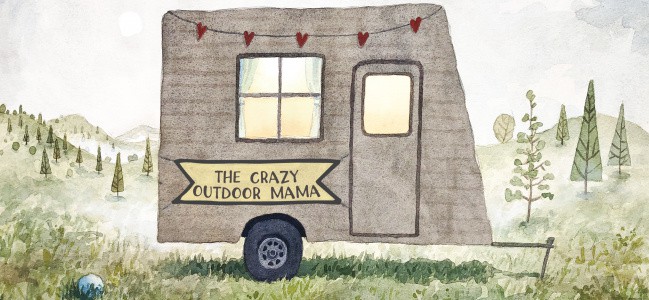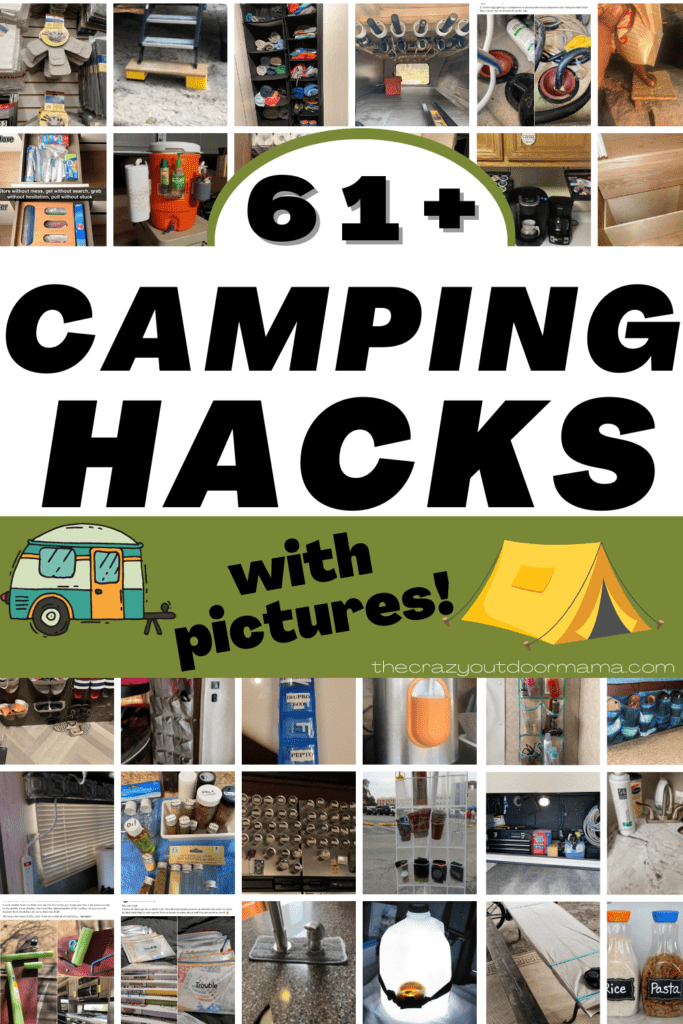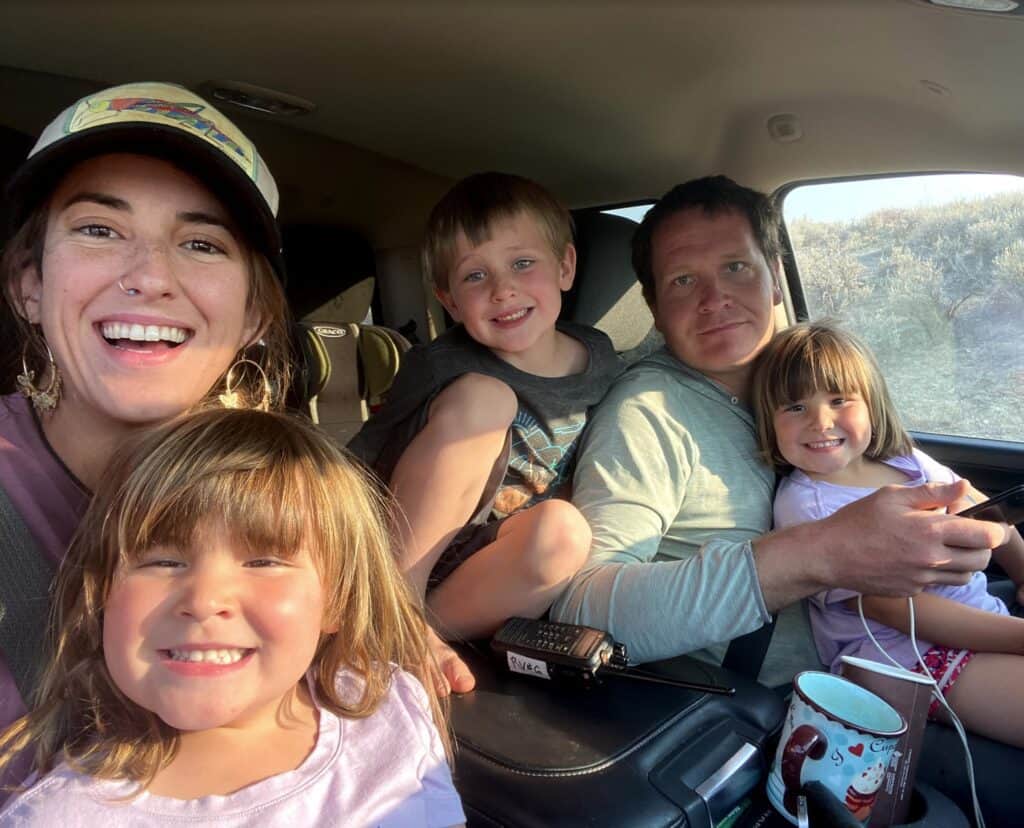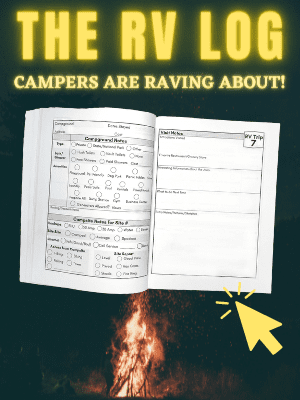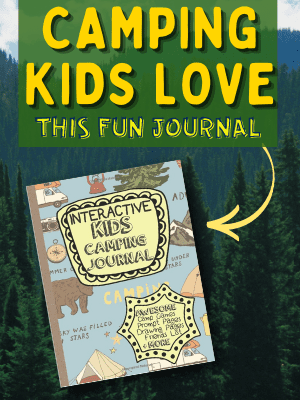At some point, your toddler is likely going to hit, and it doesn’t matter how “gentle” you’ve raised them, or how little the reason seemed for doing so – but here’s the thing, you have to handle it calmly while remaining firm!
If you’re new to parenting, you might think you need to “teach them a lesson” by hitting them back. It’s sort of the societal norm, and even I did it.
Then I realized something, after my toddler kept hitting, and obviously that method wasn’t working – why in the world am I “punishing him” for hitting by hitting? Should I not model how he should act, or help him deal with the feelings that brought him there?
I had heard of gentle parenting, but to be honest, I thought it pretty much being a door mat for your child, always afraid to tell them what they need to hear.
Then I finally got desperate, because my toddler’s behavior and
If you’re in this stage of toddlerhood, find out the one phrase that completely changed my mindset about the “terrible twos and threes”
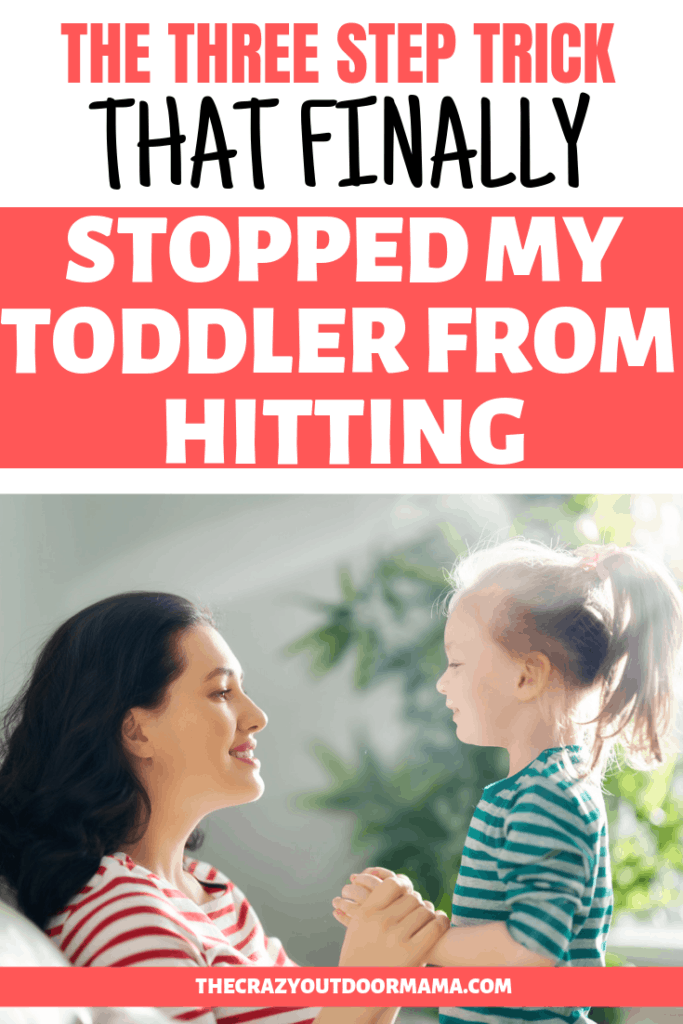
How to verbally respond when your toddler hits – directly address the hitting – “I will not let you hit me”
Often times we as parents try to say things nicely, or “dumb it down” in a way that we think our child will understand it.
But have you ever heard your toddler remember something ,or say something, and it completely catches you off guard?
It’s because they are capable of understanding way more than we give them credit for!
Here’s some quick guidance:
DO NOT SAY – “No no, we don’t hit in this house!” This is confusing because, obviously, someone hits in the house and doesn’t send a clear message.
DO NOT SAY – “Hands are not for hitting!” because they do hit somethings, such as balls, toys, highfives. This, again, isn’t the clear direct guidance they need.
DO NOT SAY – “If you hit you will get hit back!” and proceed to give them a slap. Usually toddlers hit because they are either going through something and don’t know how to express it, or because they know they will get a rise out of you, and want to do it more to learn their boundaries (or lack of!) Hitting them back does not model the appropriate response to an undesirable behavior or reaction.
DO NOT SAY – “Owwie! That hurts me!” Saying this in the babyish tone like most people would makes it a game. Toddlers are learning their boundaries, and if they find they can have “control” over you, then they will keep doing it.
The only thing you need to do is this – “I will not let you hit me”
Say thisin a firm,
It’s important to not take it personally, or sound like it bothered you or ruffled your feathers – they will zone in on that and try it more!
Related: 5 Essential Tips I wish someone would have told me about toddlers (that would have made everything WAY easier!)
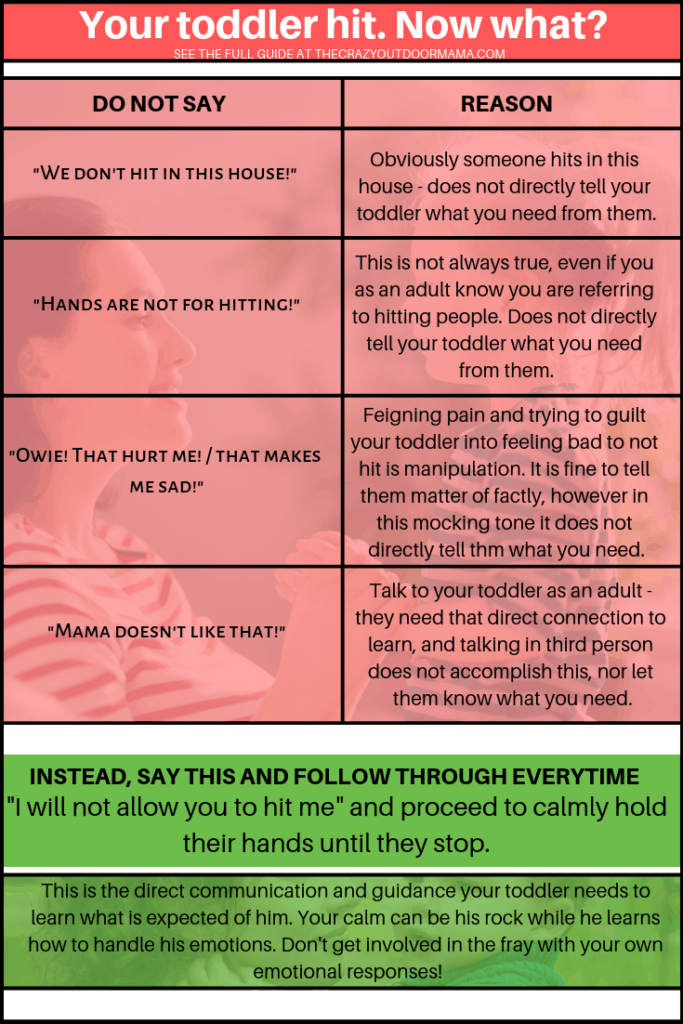
How to physically respond to your toddler while they are hitting you
While a smack might create a knee jerk reaction to grab their arm tightly and say something like “NO HITTING”, instead you need to make sure you are calm before doing anything.
Do this if your toddler is actively hitting you – grab his arms (not too tight, this isn’t for intimidation or to “teach him a lesson”) to prevent any further hitting.
If he stops, then you can let go. If he keeps on trying, say something like
“I see you’re upset about something and want to express that by hitting me. I can’t let you hit me, and you’re having a hard time with that. I’m going to help you by holding your arms.”
Your toddler needs to know that you are his rock – you cannot be ruffled by his emotional storms, and that you are
Here is a real life scenario that happened yesterday with my 3 1/2 year old (just in case you were wondering if this is legit!)
My son grabs an oatmeal bar snack “Can I have one?”
Me – “No, you have already had one today but you can have one tomorrow.”
Him – “But I really want one! Can I just have on little piece!”
Me – “I know they’re so tasty, but you have already had one and can’t have anymore today.”
Him – “I WANT ONE!” at which point he loses it and pushes me in the throat (I was sitting down on the ground at the time)
Me – “I will not let you hit me.” and I proceed to hold his arms down, calmly, and maintain a calm look on my face.
He looks at me, then instead of further freaking out, sits on my lap and we are able to talk about it “I know you really wanted a bar, and that made you angry that I wouldn’t give you one. You pushed me because you were so frustrated, but that wasn’t OK.”
Janet Lansbury (a renowned “gentle parenting” teacher) suggests offering something safe to hit should they really need to, such as a stuffed animal. I haven’t gotten to that point yet, as my son usually starts to relax once he knows I have his back. However, if just that isn’t working definitely try offering a safe way to physically express his emotions!
I want to mention that his reaction won’t likely be your kiddos – but it only took around two weeks of this to get there.
I also wanted to say I STILL sometimes have knee jerk reactions (like when I’m really tired or really stressed), and parenting this way is as much of a learning process for us as it is for the kids!
“Punishment” for your toddler who is hitting
I put discipline in quotes because it’s actually more of a “consequence”.
Discipline, atleast for me and what I grew up seeing, usually includes timeout, a spank on the butt, or removing some favorite toy.
Janet Lansbury (I know, I’m pretty much a
“[reasons the above don’t work] but the most crucial is that
I also found this regarding time out and banishment to a different room during an obvious cry out for
“ Withdrawing our affection as a form of discipline teaches a child that our love and support
With that being said… how do you help guide your child to not hit?
Logical consequences + letting them know in a calm manner that you won’t let them hit.
It sounds easy, but it’s really effective.
When they first hit someone – If your toddler keeps hitting someone at a party, you can say “I will not allow you to hit” and put their hands down. Don’t force them to say sorry, or completely remove them from the situation. Just keep an eye on them and stop them as soon as it happens.
When they repeatedly hit someone – If they repeatedly hit, then you can say “I see you are having a hard time not hitting. I am going to take you into the other room so that you can be safe and not hit.” DO NOT leave them there, stay with them! They need you to center, and abandoning them when they obviously need help with something isn’t productive!
When they hit with a toy – Let them know that they cannot hit others with said toy. If they continue to hit with it, say someting along the lines of “I see you’re having a hard time playing safely and not hitting people with that toy. I’m going to take it to help you play safer.”
I know you can’t catch everything, but if you can work on this and master it at home, it’s unlikley it will happen near as often (or at all!) when you’re out.
The most important thing is to be calm and composed, not take it personal, and not hold a grudge after you have stopped their hands and everyone has moved on.
I really like this saying when it comes to guiding toddlers who hit
” With the knowledge that their parents will always help them handle the behaviors they can’t handle themselves, children feel safe to struggle, make mistakes, grow and learn with confidence. “
Yes, this will be harder to do than just spanking them or sending them to freak out in their room alone and you go about your business. (That sounds judgy, and I’m sorry. I don’t mean it to be – I DID THOSE THINGS! And I tried this new method because I had to keep doing these things as they weren’t
But the idea is to teach them how to respond correctly though guidance and modeling it, not fear of physical pain or seclusion!
This sounds too easy, or like it won’t be effective, but toddlers respond to calm guidance and predictable boundaries!
I have repeated the same phrase “I won’t let you hit me”
As a bonus, my son is hitting his little sisters way less too! Even in intense times like when they steal his food!
Toddlers usually hit as a call out for help when they don’t know how to properly deal or express their emotions, or as a way to test if you have control.
I like this saying “Imagine driving down a bridge that didn’t have rails on a dark night. You would drive really slow, be overly reactive to small things that come up, and overall be unsure. However, if there are rails (
By showing them that you will consistently be a source of calm, unconditional love, and guidance they will learn to trust you with their tough emotions and eventually, deal with them without hitting others.
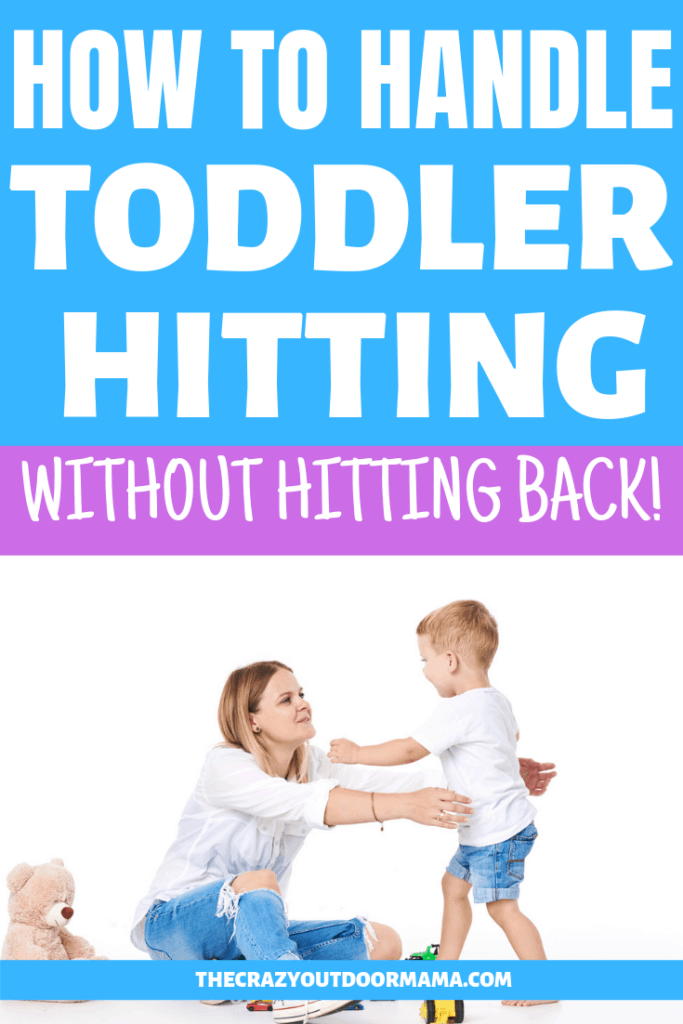
- Solar Eclipse 2024 Kids Printable Activity Pack! - April 8, 2024
- 11 RV Bathroom Makeovers to Inspire You! - April 7, 2024
- 13 Dreamy Hammock Camping Set Up Ideas + Pics - February 22, 2024
